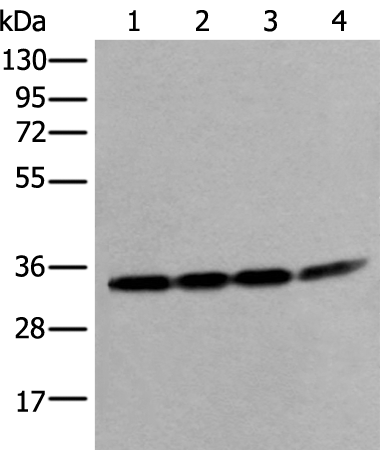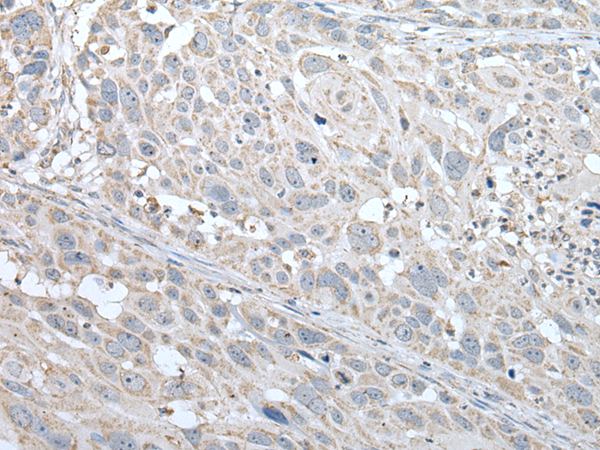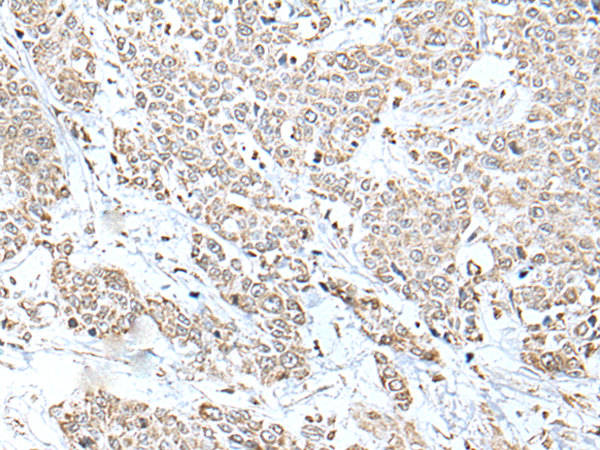


| WB | 1/500-1/1000 | Human,Mouse,Rat |
| IF | 咨询技术 | Human,Mouse,Rat |
| IHC | 咨询技术 | Human,Mouse,Rat |
| ICC | 技术咨询 | Human,Mouse,Rat |
| FCM | 咨询技术 | Human,Mouse,Rat |
| Elisa | 咨询技术 | Human,Mouse,Rat |
| Aliases | PORIN; VDAC-1 |
| WB Predicted band size | 31 kDa |
| Host/Isotype | Rabbit IgG |
| Antibody Type | Primary antibody |
| Storage | Store at 4°C short term. Aliquot and store at -20°C long term. Avoid freeze/thaw cycles. |
| Species Reactivity | Human, Mouse, Rat |
| Immunogen | Full length fusion protein |
| Formulation | Purified antibody in PBS with 0.05% sodium azide and 50% glycerol. |
+ +
以下是3篇关于p60 Katanin抗体的代表性文献摘要:
1. **文献名称**:Katanin p60-related tubulin-severing protein mediates neurite outgrowth and is regulated by ubiquitin-proteasome pathway
**作者**:Yu W. et al. (2008)
**摘要**:该研究通过p60 Katanin抗体抑制实验,证明其在神经元轴突生长中的关键作用,发现蛋白酶体途径通过降解p60 Katanin调控微管动态,影响神经突起的形态发生。
2. **文献名称**:Katanin, a microtubule-severing protein, is a novel AAA ATPase that targets to the centrosome
**作者**:Hartman J.J. et al. (1998)
**摘要**:首次克隆并鉴定了p60 Katanin的ATP酶活性,利用特异性抗体证实其在有丝分裂纺锤体中的定位,揭示了其通过切割微管调控细胞分裂的分子机制。
3. **文献名称**:Purification and ATPase activity of katanin, a microtubule-severing AAA protein
**作者**:McNally F.J., Vale R.D. (1993)
**摘要**:通过抗体亲和层析法纯化p60 Katanin蛋白,证明其依赖ATP的微管切割功能,为后续研究其细胞生物学功能提供了重要工具。
注:文献信息经过简化整合,实际引用建议核对原文DOI或PMID获取完整细节。
The p60 Katanin antibody targets the catalytic subunit of Katanin, a microtubule-severing protein critical for cellular processes like mitosis, cytoskeletal remodeling, and neuronal development. Katanin, composed of a p60 subunit (ATPase) and a p80 regulatory subunit, disassembles microtubules by hydrolyzing ATP, enabling dynamic reorganization of microtubule networks. The p60 subunit (encoded by *KATNA1* in humans) mediates enzymatic activity, while p80 directs localization.
This antibody is widely used to study Katanin's role in cellular functions, including spindle formation during cell division, axon growth, and dendritic pruning. Dysregulation of p60 Katanin is linked to neurodevelopmental disorders, microcephaly, and cancer, highlighting its biomedical relevance. Researchers employ the antibody in techniques like Western blotting, immunofluorescence, and immunohistochemistry to detect p60 Katanin expression, localization, and interactions.
Commercial p60 Katanin antibodies are typically raised in rabbits or mice against specific epitopes, with validation in knockout models to ensure specificity. Their application has advanced understanding of microtubule dynamics in health and disease, offering insights into therapeutic targeting of Katanin-related pathways.
×